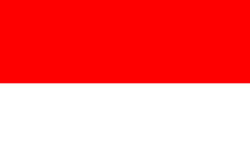Everyday Vocabs in Bahasa Indonesia
- Prelude to Indonesia

- Apr 27, 2022
- 3 min read
Welcome~
Today, I’ve decided to write and introduce some of the more useful vocabs that are often used in Indonesia. If you’re familiar enough with Bahasa Indonesia, you might already know some of these words.
I don’t really know how to explain these, so for the time being I’ll only give them their English translation. The usage is pretty similar to their English counterpart, I would say.
Some more basic greetings have been explained in the previous posts, especially the one regarding dates and times. The ones I’ll present today is more towards what we will use in everyday conversation, both formal and casual ones.
Alright, without further ado, let us begin!
The term will first be written in Bahasa Indonesia, followed by an equal mark then it’s meaning in English, along with an explanation (if any) in the brackets following them.
Iya or Ya = ‘Yes’ or ‘Yeah’
Tidak = ‘No’ (Those in Java might say nggak, gak, or ndak instead when talking casually)
Apa kabar? = ‘How are you?’
Baik! = ‘I’m fine!’
Selamat datang! = ‘Welcome!’
Maaf = ‘Sorry’ (Nowadays, especially in metropolitans, people are more comfortable with saying ‘sorry’, and saying maaf can be seen as stiff, though it depends on the people)
Permisi = ‘Excuse me’ (It can also be shortened into Misi(h) with a soft ‘h’ sound at the end)
Terima kasih or Makasih = ‘Thank you’ or ‘Thanks’
Tolong = ‘Please’ (Can also be used when asking for help)
Apa = ‘What’
Siapa = ‘Who’
Kapan = ‘When’
Di mana = ‘Where’ (However, if the question is something along the line of ‘Where are you going’, it will be ke mana, as di means ‘at/in’ whereas ke means ‘to’ as in goin to some place)
Mengapa = ‘Why’ (Casually, we usually say kenapa instead of the more proper mengapa)
Bagaimana = ‘How’
Berapa harganya or berapa = ‘How much is it’ or ‘How much’
Hari ini = ‘Today’
Pagi ini = ‘This morning’
Malam ini = ‘Tonight’
Kemarin = ‘Yesterday’
… hari yang lalu = ‘… days ago’ (fill the blank with the cardinal number)
Besok = ‘Tomorrow’
Besok lusa or simply lusa = ‘The day after tomorrow’
… hari lagi = ‘… more days’ (fill the blank with the cardinal number)
Selamat ulang tahun! = ‘Happy birthday!’
That’s all I can think of right now…
Anyway, as I feel this post is still too short, I’ll add some slangs used often when chatting online in Bahasa Indonesia.
When laughing, whether it’s LOL or ROFL, we mostly use wkwkwkwk. Some people, myself included, differs from the norm as I don’t feel comfortable using that and I have my own, you can say, trademark laugh when chatting.
Tidak or nggak, which means ‘no’, is sometimes only written as g.
Yang, or ‘which’, is written as yg.
Aku, which is a casual way to refer to oneself (‘me’ or ‘I’), is often written as ak or q (the latter is closer in meaning to ‘my’).
Dari, which means ‘from’, is often written as dr.
The last one I’m giving you is when a word is repeated, either to signify that the object is plural or because the word itself consists of two same words. We usually add either “ or 2 at the back of that word. For example: kupu-kupu (‘butterfly’) becomes kupu2 or kupu”; and meja-meja (‘desks’) become meja2 or meja”.
As for abbreviations and slangs used in everyday life, there are honestly too much to be explained one by one, and each province or city has their own slangs. Combined with our respective dialect, it can sound like a completely different language, yet at the same time we can still understand most of what the other party wants to say.
This come from experience, however, and lots of socialization. And depending on where you will live or with people from where you will communicate, I think it’s better to slowly familiarize yourself rather than trying to understand every slangs that existed in Bahasa Indonesia.
Even Indonesians don’t know every slangs that exist in Indonesia, as we do come from various background and cultures. Some are even influenced by their ancestors’ birthplace, such as Chinese (or Hokkien perhaps, I’m not really sure), Netherlands, or Malay.
Another thing to note is that these local languages sometimes have levels of formality and politeness. We will even combine these different dialects with Bahasa Indonesia on everyday conversation, especially when we know that the other party can understand what we want to say.
Alright, that’s it for today’s post.
As this post is quiet short, I’ll skip making the conclusion for today (AKA I’m too lazy to edit things right now ( ͡❛ ₃ ͡❛))
Don’t forget to review the past lessons too!
Stay safe and see you^^




Comments